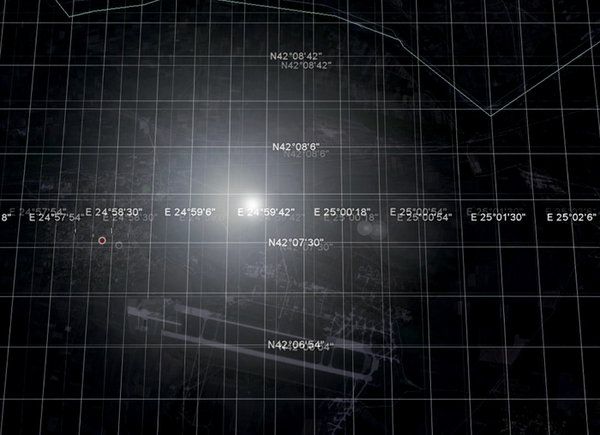22/9/2009
HR-Stamenov
Platform, Munich
The Phenomenon of W24 58'59,43'' N42 07'55,29. The artist uses elements of film production (in the construction of the narrative) and advertising (in the image presentation), always creating a particular situation of perception. Curated by Vladiya Mihailova.

Curated by Vladiya Mihailova
The Phenomenon...
On September 29th, 1999, a train disappears. It disappears and carries the passengers, the engine driver, two ticket collectors and a policeman away into a light hole where it transforms into a time machine. Such is the story that HR-Stamenov offers the viewer who faces a train suddenly appearing behind the windows of stores and buildings in urban spaces in Milan, Florence, Munich ... The story is an inseparable part of a video installation which the artist exhibits in different places, building up gradually a map of the points of emergence of the train. His theory of the light holes relates to the disappearance and provides the context for perceiving the work by putting the viewer completely in doubt about what is real and what is imaginary - much the way sci-fi films create a fictional reality produced by a technological progress or a super-natural phenomenon or knowledge.
HR-Stamenov deals with the possibility of building such a narrative with the means of visual art by referring to one of the most visionary and “conspiracy” themes supporting technology development - the time machine, and applying the theories of time-spatial changes in black holes.
The ''Ghost Train'', as the artist sometimes presents his work, appears in public spaces and makes the viewer face a fascinating image similar to those large, illuminated advertising panels, turned on spotlights and plasma screens, which are designed to attract the eye, ''persuade'' and enchant.
Minimalist in its design, the work of the HR-Stamenov uses elements of film production (in the construction of the narrative) and advertising (in the image presentation), always creating a particular situation of perception where the audience simultaneously participate in an on-going narrative and is confronted by the immediate image in the urban environment, which the viewer themselves have to distinguish as imaginary or real. The artist plays with the idea of the society of the spectacle, creating an immediate ''entertainment'', which, in its turn, raises the question about where we put the boundaries today - between cinema and reality, between imaginary and real, between science and art.
Vladiya Mihaylova
In the frames of Sofia Spionage
Platform3
Kistlerhofstrasse 70 - Munich
Mon-sun 10 - 17, Fri 10 - 15



